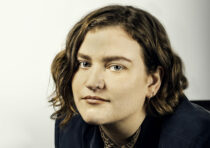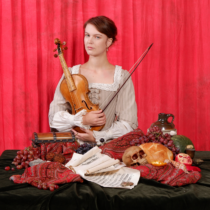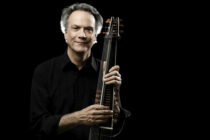Pyatt Hall, VSO School of Music
Subscriptions: To purchase tickets to this performance as part of a subscription to 3 or more concerts and receive a 25% discount off the full ticket price, please call Early Music Vancouver’s box office at 604-732-1610 or email boxoffice@earlymusic.bc.
Artists: Ellen Torrie, soprano & baroque guitar; Marie Nadeau-Tremblay, violin; Sylvain Bergeron, archlute
EMV’s Emerging Artists’ Concert features the next generation of musicians performing works by Francesca Caccini and Barbara Strozzi, Henry Purcell and J.H. Schmelzer. The 17th century was a time of great innovation in music thanks to the rise of composers who happily defied the rules of composition. Early Music Vancouver’s 2022 Emerging Artists, Ellen Torrie, soprano, and Marie-Nadeau Tremblay, violinist, are part of the next generation of musicians who also defy established practices and bring a fresh look at early music.
Ellen Torrie is a singer-songwriter and storyteller based in Montréal who works and collaborates fearlessly across a multitude of musical genres and artistic mediums. They have just completed their master’s degree in early music voice at McGill University.
Marie Nadeau-Tremblay discovered the Baroque violin during her last year at McGill University. Transported by the beauty of this music, she plunged headfirst into the Baroque world. Marie released her first solo album, Preludes et Solitudes, in 2021 and promptly won the Discovery of the Year Prize at the Opus Awards 2022. We are excited to be able to support both of these genre-pushing young artists at Early Music Vancouver, and we look forward to seeing them make their mark in the music world.
“My passion is to bridge musical and social worlds by using elements of historical performance practice to democratize music and facilitate community storytelling.”
– Ellen Torrie
This concert is generously supported by the EMV Board of Directors.
PURCHASING TICKETS
Click here to purchase tickets.
Subscriptions: To purchase tickets to this performance as part of a subscription to 3 or more concerts and receive a 25% discount off the full ticket price, please call Early Music Vancouver’s box office at 604-732-1610 or email boxoffice@earlymusic.bc.
PROGRAMME
Henry Purcell (1659-1695)
The Blessed Virgin’s Expostulation
Francesca Caccini (1587-1640)
Lasciatemi qui solo
Barbara Strozzi (1619-1677)
A donna belle e crudele
Pedro Lopes Nogueira (1700-1770)
Prelude in f major
Biagio Marini (1594-1663)
Sonata quarta
Henry Purcell (1659-1695)
Fairest Isle
O let me weep
She loves and she confesses too
PROGRAMME NOTES
Part of what draws an artist to their path is the deep inner sense of having something new to say. As we begin to grow our roots in the early music community, the desire to innovate is tempered with a sense of loyalty to the cherished traditions and historical practices.
The baroque composers we love, whose legacies endured over centuries, were considered innovators of their time. Contrastingly, there are surely many composers and musicians lost to us today because their gender, race, or socioeconomic status excluded them from the treatises we revere and from which we reconstruct our performances.
Willa Cather said “There are only two or three human stories, and they go on repeating themselves as fiercely as if they had never happened before.” Perhaps innovation is simply a new way to tell an old story. Music is the glue that holds those stories intact throughout a long and dynamic human history.
Published in 1693, “The Blessed Virgin’s Expostulation” is one of Henry Purcell’s most famous devotional songs. Purcell, who was responsible for many innovations in vocal music at the end of the 17th century, used the latest trend in Italian composition to conceive this five section canata, illustrating a rich spectrum of musical styles and emotional affects. The text by Nahum Tate is a reimagining of the passage from St. Luke’s gospel where the twelve-year-old Jesus goes missing in the Temple, followed by his mother Mary’s anguished efforts to find him. Panic, doubt, terror, nostalgia, and desperation ensue as Mary begins to doubt what she was told by the angel Gabriel: that her child is special, that she is chosen as his protector, and that their relationship has deep spiritual significance. Mary begs for Gabriel to show himself to her again and validate her beliefs about Jesus. She wants to know that what she has come to believe is real and not a misconception of her role in Jesus’ story.
Francesca Caccini was an Italian composer, singer, lutenist, and poet of the baroque era. She was the highest paid musician of the Medici court in 1614. In 1625, she became the first woman to write and publish an opera, a massive feat in the competitive and overwhelmingly androcentric realm of 17th century Italy. Her piece “Lasciatemi qui solo” paints a deeply tragic scene in which the protagonist begs to be left alone to die. The intimate solitude illustrated in Caccini’s texts inspired a self-accompanied version of this piece on baroque guitar, a historical practice that has been kept alive by a handful of performers in the last centuries. Reviving the intimacy of this lost musical tradition is an innovative way to reinvigorate historical performance today.
Where “Lasciatemi qui solo” is somber, Barbara Strozzi’s “Donna belle e crudele” expresses a lighter but derisive attitude toward unrequited love. Each verse is a metaphor for a physical attribute belonging to the object of desire. Musically, each new metaphor is given space for reverence and affectionate consideration before the singer bemoans how these beautiful elements are misused on a person who cannot make them “real” by giving the objectifier what they truly desire – reciprocation. Strozzi, another prominent virtuosa of the Baroque period, composed audaciously and with unmistakable personality. This is perhaps the reason she had more secular music in print than any other composer of the era, despite having no consistent patronage and a strained relationship to the aristocracy due to her illegitimate status.
Not much is known about Portuguese composer Pedro Lopes Nogueira, other than his collection of 24 preludes and fantasies dating from the early 18th Century— and from which this Prelude in F Major is taken. Though these works are little-known and quite infrequently performed, this prelude immediately charms with its freshness and spontaneity. Nogueria gives the impression that he wrote this prelude in one sitting, following the inspiration of the moment, note by note, without knowing where the next measure would take him. This type of creative freedom is an innovative tool that emancipates us from artistic conformity.
Purcell’s “Fairest Isle” comes from his semi-dramatic opera, King Arthur. Composed in 1691, it belongs to the genre of “Restoration spectacular”, an innovative theater approach involving complex mechanical set pieces, elaborate costumes, and fireworks. “O let me weep” sung in the final act of Purcell’s The Fairy Queen was one of the first pieces available in score format for public distribution marking a significant advancement in accessibility of music for personal use. “She loves and she confesses” sets Abraham Cowley’s poetry to a repetitive ground bass, making it another excellent candidate for self accompaniment.
Though innovation may take on a new definition in each generation, it is an essential quality of establishing a voice and a place in the community. Trusting our inner creative impulse while honoring tradition is how we innovate with integrity. Discovering underplayed repertoire, creative speculation of lost traditions, and diligent study of the available historical sources, are all important aspects of our musicianship. All of these elements serve to bring this music to life through our own voices and to tell these immortal narratives through our perennial lens as “the next generation.”

Ellen Torrie, soprano & baroque guitar
Ellen Torrie is an Ontario-born, soprano and project maker living in Montreal who just completed a master’s degree in early music performance at McGill University under the tutelage of Dominique Labelle. Most recently, Ellen sang the title role in Charpentier’s oratorio Judith with ensemble Capella Antica and is lead soprano at Christ Church Cathedral, Montreal.
While studying music therapy at Acadia University, Ellen appeared frequently as a soloist with local ensembles including Symphony Nova Scotia, and was lead soprano of the Manning Chapel Choir from 2014-2018. In 2017, Ellen was awarded the Canadian Federation of University Women scholarship which funded their participation in Accademia Europea Dell’Opera in Lucca, Italy, where they played Oberto in Handel’s Alcina. This experience motivated Ellen to pursue a career in performance and upon graduation, Ellen moved to Montreal to study with soprano Suzie LeBlanc.
Ellen frequently returns to the Maritimes for solo recitals, collaborations, and residencies. Ellen also recently completed an artist residency at Banff Arts and Creativity Centre with Canadian tenor Kerry Bursey, as the newly formed early music/folk duo Kalliope. Ellen is currently exploring the practice of self-accompanying early music on baroque guitar. As a queer, non-binary musician, Ellen is inspired by the possibility that their queer ancestors had their own musical traditions and that through research, creative speculation, and performance, we can tell a more inclusive and rich story about music and humanity.

Marie Nadeau-Tremblay, violin
During the final session of her undergraduate degree in violin performance at McGill University, Marie Nadeau- Tremblay decided to try her hand at the Baroque. She joined the university’s Baroque orchestra and fell head over heels in love! Transported by the beauty of this music— and finding resonance with its mode of expression— she decided to plunge headfirst into the Baroque world. After obtaining a Licentiate Degree, she pursued further studies under the tutelage of Hank Knox, Lena Weman, and Olivier Brault, receiving a Master’s Degree in Early Music Performance. After being awarded numerous prizes and scholarships at McGill — including the prestigious Mary McLaughlin prize, which she won four years in a row — Marie Nadeau-Tremblay received an Early Music America grant in 2017. More recently, in 2019, she swept the honor roll of the Concours de musique ancienne Mathieu Duguay with an unprecedented four awards: First Prize, the People’s Choice Award, the Festival Montréal Baroque Prize, and the Été musical de Barachois Prize.

Sylvain Bergeron, archlute
Considered “a supremely refined, elegant and cerebral musician” (Ottawa Citizen), Sylvain Bergeron is a master of the lute and family of plucked instruments, including the theorbo, archiluth and baroque guitar. He is in great demand on the North American music scene as a soloist and continuist. He is one of the pioneers of early music in Canada and has helped establish the lute as a viable instrument at the highest level of professionalism. His work has confirmed the importance of plucked instruments and helped validate their place in Baroque ensembles and orchestras in Canada.
Sylvain Bergeron has participated in more than 70 recordings, many of which have won prizes and awards. His most recent solo album, Gioseppe Antonio Doni’s Lute Book, published by ATMA Classique in 2015, was widely praised for his “strong lute technique combined with outstanding musical intelligence and impeccable phrasing” (The WholeNote ), while the magazine Goldberg described his game as “imbued with both great rhythmic vitality, delicacy and nuance”.
Co-founder and co-artistic director of La Nef, Mr. Bergeron has directed several award- winning productions of this Montreal ensemble since 1991. He has taught lute at McGill University and the Université de Montréal since 1992.


